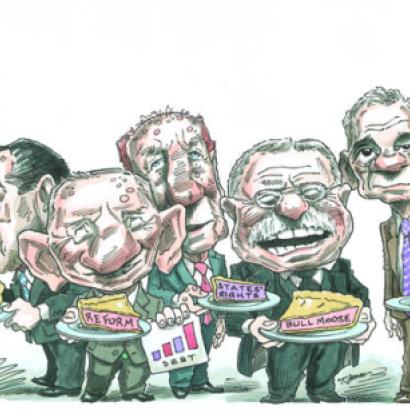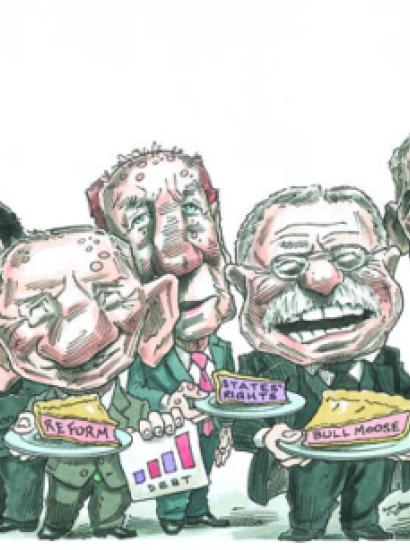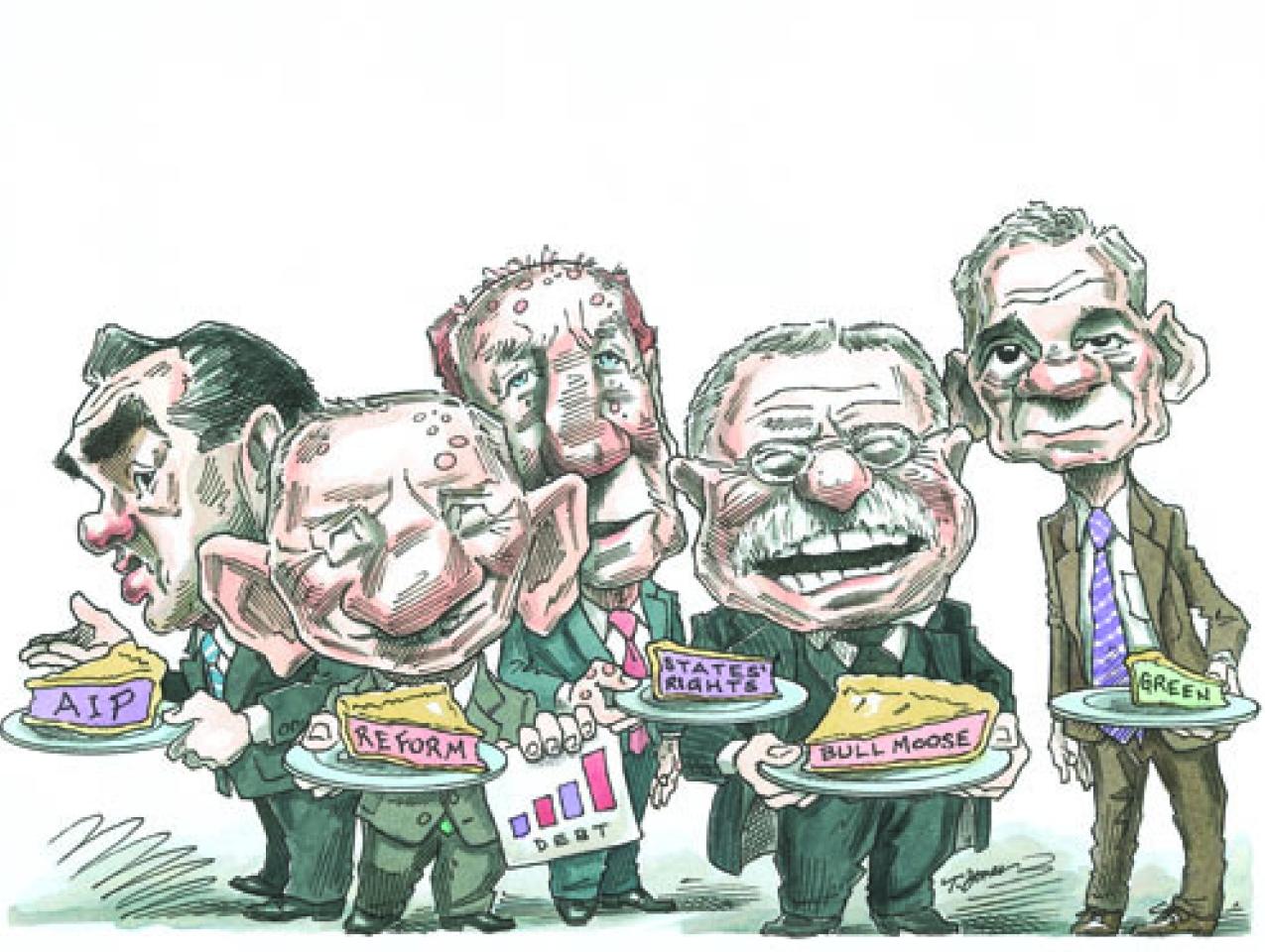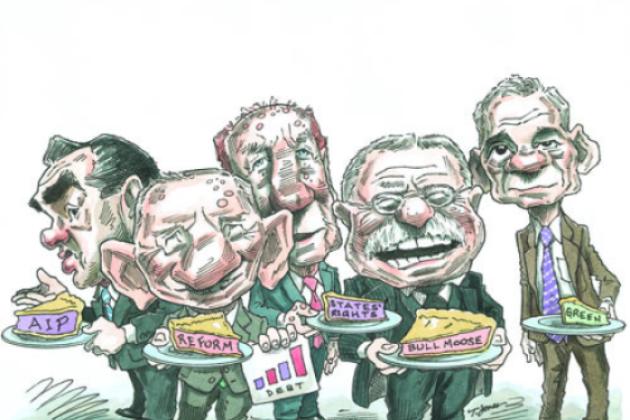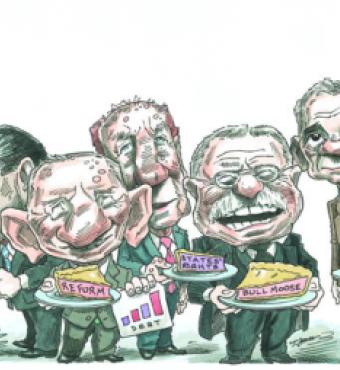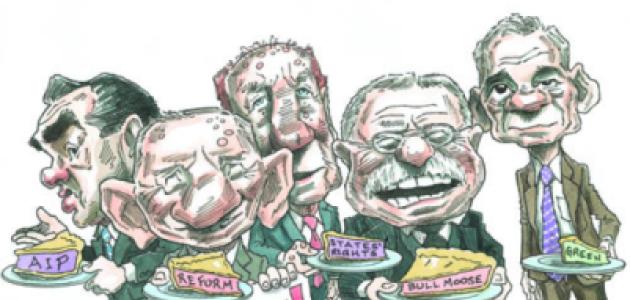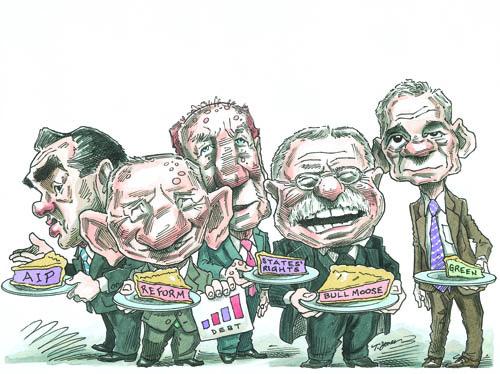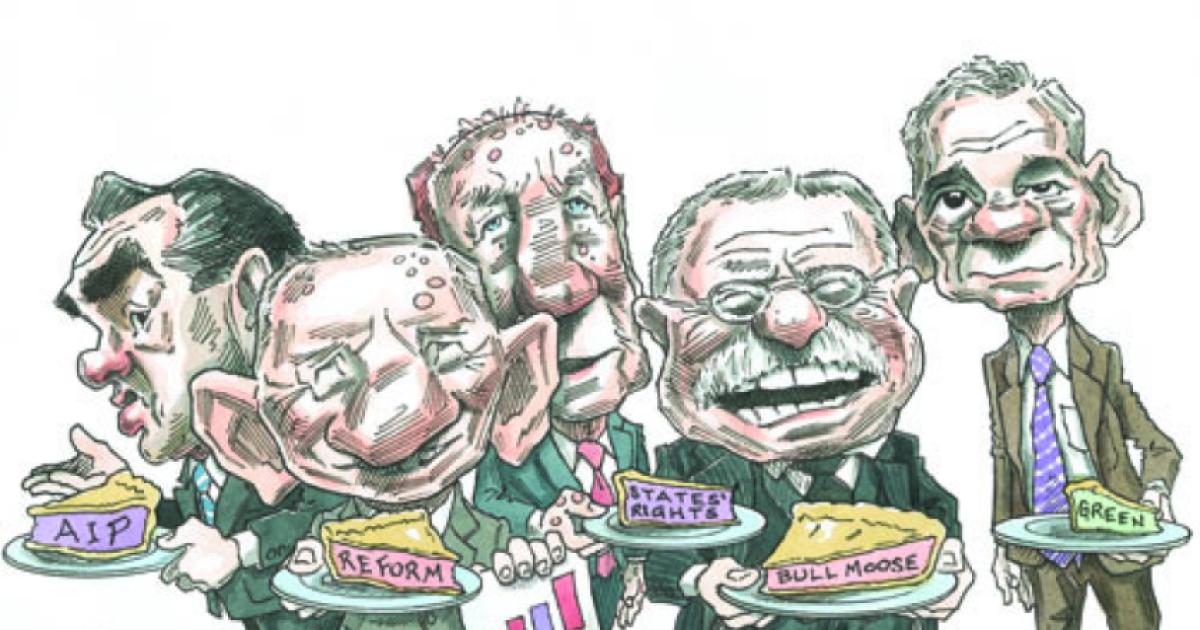- Economics
- US Labor Market
- Contemporary
- Law & Policy
- Campaigns & Elections
- State & Local
- The Presidency
- History
- Politics, Institutions, and Public Opinion
Every leap year thoughts turn, not just to love, but to a third political party free of the encrustations encumbering Democrats and Republicans. This year, leaders of one self-appointed group, traveling under the moniker Americans Elect, promise that their presidential and vice-presidential candidates, one from each of the two major parties, will be on the November ballot in every state. They plan to host a “secure, online convention” in June but reserve the right to exclude candidates deemed unworthy.
Third-partyism is tempting. The idea of a middle way has appealed to certain Washington insiders unhappy with the Obama administration but also dissatisfied with those pursuing the Republican nomination.
As ever in the American two-party system, a winning party must appeal to multiple, sometimes contradictory, constituencies. Democrats must satisfy job-hungry unions and antigrowth environmentalists. Republicans must resolve differences between social and economic conservatives.
Given such heterogeneities, leaders must be vague and inconsistent. They are wont to change their minds and appear to be lacking in all conviction. By comparison, those who lead third parties can, at least for a while, inspire by their apparent nobility of presence and purity of heart.
So it comes as no surprise that in virtually every presidential cycle some such movement is afoot, the most notable modern examples being Strom Thurmond’s Dixiecrat Party in 1948, Ross Perot’s largely self-financed campaigns in 1992 and 1996, and Ralph Nader’s Green Party runs in 1996 and 2000.
When a new party is formed, the allure is terrific and the excitement intense. After the campaign is over, however, those who listened to the song of the third-party siren experience regret like that of the happily married spouse lured into an affair. Perhaps that’s why neither Thurmond nor Perot nor Nader ranks as a folk hero. Even Teddy Roosevelt lost much of his luster after he tried to regain the presidency under the Progressive Party label. Somehow his face, set back in a corner of Mount Rushmore, barely belongs among the presidential giants.
Indeed, there is something illicit, almost unconstitutional, about third-partyism. Admittedly, Abraham Lincoln led a new party to victory in 1860, but the Republicans triumphed only because the old party system was falling apart, with the Democrats dividing into northern and southern wings and the Whigs collapsing altogether. The fundamental flaw baked into the original Constitution was eradicated, and a new, more perfect union was created, though only after oceans of bloodshed.
If the Constitution, as reconstructed by Lincoln, is the bedrock upon which an exceptional American government rests, a stable, two-party system is hardly less crucial to its long-term health. Those who wrote the Constitution deliberately separated power so as to encourage compromise among conflicting interests, and the Bill of Rights, together with the Civil War amendments, provides additional protection of the rights of citizens. The two-party system furthers those same objectives by fostering heterogeneous political organizations and leaders with the skills needed to negotiate and compromise, even when large issues are at stake.
Key election rules sustain the country’s two-party system. Members of the Electoral College must themselves be chosen by a plurality of the voters in each state. It’s like a horse race—whoever gets past the post first wins it all. In such contests, the party that is large and heterogeneous will beat any other party not equally amorphous. Both parties are held together by tentative compromises that paper over deep-seated contradictions. Inasmuch as similar rules apply to races for the Senate, the House of Representatives, and most state offices, the same two parties dominate elsewhere as well.
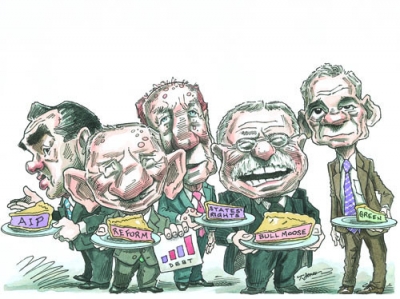
Given those election rules, the tea party is necessarily a passing fancy. So is Occupy Wall Street. Libertarians and Greens are mostly minor nuisances, struggling on the fringe of political reality.
Not so in Europe, or in Israel. The French, the Italians, the Spanish, and the Greeks, to name only those teetering on the verge of bankruptcy, choose their members of parliament by a set of rules that encourages a plethora of what might be called parties of conviction—socialists, communists, religious groups, free-market conservatives, Greens, and what have you—all of whom resemble one another in the narrow slice of the electorate to which they appeal. But it is the Israelis who have carried party splintering to its finest art, filling their assembly with representatives of all conceivable stripes, including those from two-bit extremist parties.
We don’t have to go overseas to discover the absurdities that develop when election rules facilitate multiple factions. In the Iowa caucuses, small factions can capture a modicum of power in precinct elections because multiple delegates are chosen and multiple candidates can claim victory (by beating “expectations”).
Fortunately, the rules governing the Iowa caucuses play a lesser role in the primaries. In most of them only one candidate can win the delegates chosen within a geographic area. As the race moves forward, a candidate has to do better than just match expectations. Any aspiring nominee must convince voters that he has a chance of beating the incumbent in a head-to-head contest.
Were the politicians anticipating a major third party, politics within the Republican and Democratic parties would immediately change. On the Republican side, conservative forces would convince themselves they needed only about 35 percent of the vote to win. On the Democratic side, the president, making a similar calculation, would shift to the left to stabilize support among his left wing. Even if a third-party candidate could defy modern history and win the presidency, he would have to deal with two polarized opposition parties on Capitol Hill.
If the United States had multiple parties, leaders could articulate sharp, clear principles as some of the candidates did in Iowa. But as good as that sounds, it would only make it harder to govern a large, heterogeneous nation.
Chances are pretty good that the presidential candidate selected by Americans Elect will be remembered by history as a Thurmond/Perot type, not a Lincoln.
I, for one, shall resist the song of the third-party siren.








